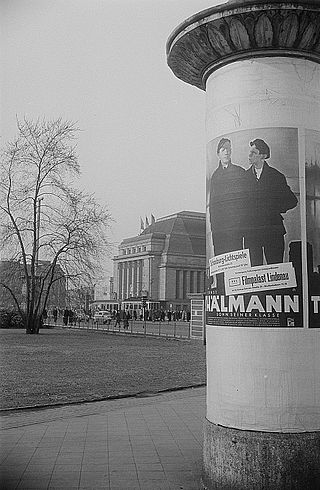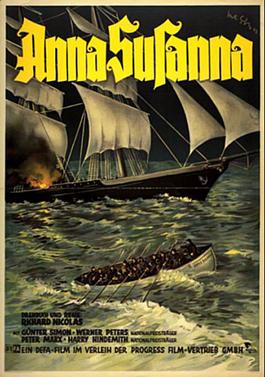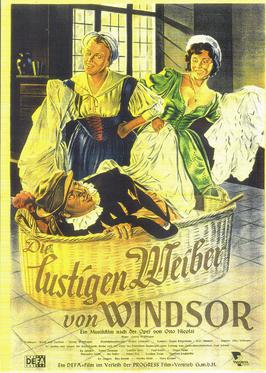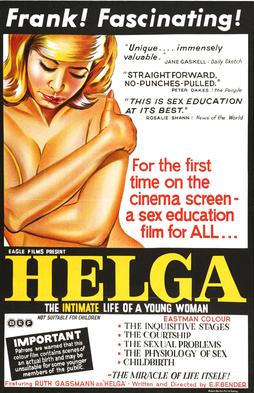
DEFA was the state-owned film studio of the German Democratic Republic throughout the country's existence.

Ernst Klee was a German journalist and author. As a writer on Germany's history, he was best known for his exposure and documentation of medical crimes in Nazi Germany, much of which was concerned with the Action T4 or involuntary euthanasia program. He is the author of "The Good Old Days": The Holocaust Through the Eyes of the Perpetrators and Bystanders first published in the English translation in 1991.

Slatan Theodor Dudow was a Bulgarian born film director and screenwriter who made a number of films during the Weimar Republic and in East Germany.

Ernst Thälmann is an East German film in two parts about the life of Ernst Thälmann, leader of the Communist Party of Germany during much of the Weimar Republic, directed by Kurt Maetzig and starring Günther Simon in the title role. The first part, Ernst Thälmann - Sohn seiner Klasse, was released in 1954. It was followed by the 1955 sequel. Ernst Thälmann - Führer seiner Klasse.

Günther Simon was an East German actor.
Girls in Gingham —sometimes called Beaverskin—is a 1949 German drama film directed by Kurt Maetzig.

Familie Benthin is an East German film. It was released in 1950.

Anna Susanna is an East German drama film directed by Richard Nicolas. It was released in 1953.

Berlin, Schoenhauser Corner is an East German crime film directed by Gerhard Klein. It was released in 1957.

The Sailor's Song is an East German black-and-white film directed by Kurt Maetzig and Günter Reisch. It was released in 1958.

Divided Heaven is an East German drama film directed by Konrad Wolf. It was released in 1964.
Dr. Ahrendt's Decision is an East German black-and-white film, directed by Frank Vogel. It was released in 1960.
Kein Ärger mit Cleopatra is an East German comedy film, directed by Helmut Schneider. It was released in 1960.
On the Sunny Side is an East German musical comedy film, directed by Ralf Kirsten and starring Manfred Krug. It was released in 1962.

The Merry Wives of Windsor is a 1950 East German musical comedy film directed by Georg Wildhagen. It was based on William Shakespeare's play by the same name.
Ute Lubosch is a German actress, who began her career in East German theater, film, and television.
Ralf Kirsten was a German film director and screenwriter. He directed 22 films between 1955 and 1986. His 1984 film Where Others Keep Silent was entered into the 14th Moscow International Film Festival.

Helga – Vom Werden des menschlichen Lebens is a 1967 West German sex education documentary and the first film of the Helga trilogy, starring Ruth Gassmann as Helga. Its release in West Germany was followed by international releases to many European countries, the British Commonwealth and the United States. It became one of the greatest box-office successes of West German cinema, viewed by forty million people in West Germany and internationally. In the first months of its showing in West Germany the audience had reached four million people. The film featured scenes of childbirth which were the first to be shown publicly in Germany. Helga was the first in a series of educational films which were considered "relatively permissive" at the time. The film was considered a part of an "enlightenment wave" which was undertaken by the West German Federal government at the time. In 1968, in France, the film was viewed by five million people. In Grenoble alone it is reported that 60,000 viewers had seen it in the first days of its screening, out of a population of 150,000. In Tours, the film played to full-houses for three consecutive weeks. The film used animation, stock footage and microphotography to depict the stages of life from conception to childbirth.

Michael Kann is a German film director and actor. He was born in Berlin, East Germany, on 13 January 1950.
Joachim Werzlau was a German pianist, radio consultant and composer. He belonged to the first generation of composers in the GDR, where he was also active in organisations and politics. As a pianist, he played for the theatre, for Mary Wigman's dance school, and a kabarett, among others. He composed popular songs, music for audio plays, film scores, incidental music, and three operas. With films such as Nackt unter Wölfen and Jakob der Lügner, he was the most popular film composer of the GDR of his time.













